How to avoid missing 98% of opportunities
At around $1.9 trillion Australian dollars, the Australian equity market is a minnow by global standards. It represents roughly 2% of global equity markets. Said another way, by only owning Australian shares, you are missing 98% of the world's investment opportunities.
The largest market globally is the US, accounting for around 40% of total world equity markets. The graph below plots the percentage return on the S&P 500 and ASX 200 over the last 5 years. Over this period, the S&P 500 outperformed the ASX 200 by nearly 50%. For the sake of comparison, both indices include dividends, and are quoted in Australian dollars. An investment of $100,000 in each index, would be worth $240,000 (S&P 500) and $160,000 (ASX200).
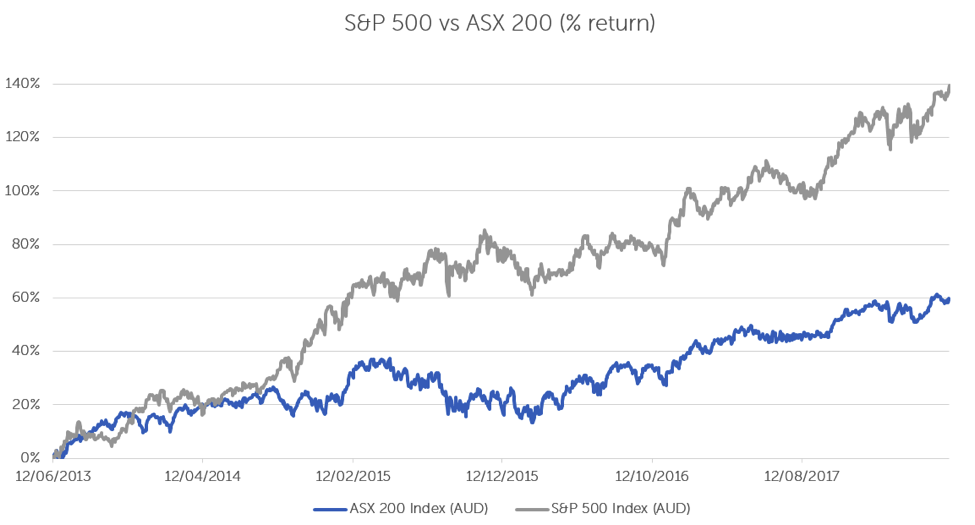
A significant proportion of the S&P 500’s outperformance can be attributed to the growing importance of the large technology companies, and the ‘new economy’.
Why should I consider investing overseas?
The Australian market is highly concentrated in two sectors, namely Financials (e.g. ANZ, CBA, Westpac, NAB) and Materials (e.g. BHP, RIO). These two sectors make up a whopping 51.5% of the ASX200.
In contrast, in the US, Financials and Materials make up a mere 17% of the S&P 500, and while the Banks and Miners enjoy the benefit of franking credits, they are not exposed to the ‘new economy’.
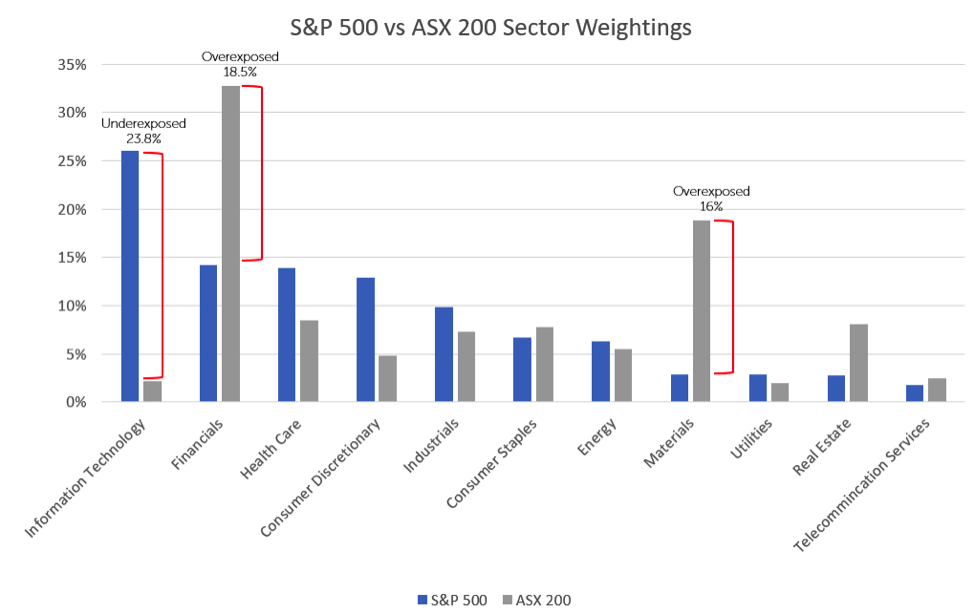
(Source: S&P 31 May 18)
It is virtually impossible to access the ‘new economy’ with a purely Australian focused portfolio. Australia’s Information Technology sector makes up a meagre 2.2% of the ASX200 Index vs. 26% of the S&P 500. Furthermore, the quality gap between these entrenched, US technology businesses and Australian technology companies is vast, and frankly incomparable. Fortunately, Australian investors do not have to miss out. We discuss three opportunities below, accessible to Australian investors willing to invest globally.
The inexorable growth in digital advertising revenue
The graph below compares time spent on digital media versus traditional media. In 2018, time spent on Digital Media (Search, Social, & Video) is expected to converge with time spent on Traditional Media (TV, Print, & Radio). As this occurs, the advertising dollars will follow, and a larger proportion of total media spending will be allocated to digital media platforms. Online advertising spend is estimated to reach parity with offline spend by 2020 (source: Magna).
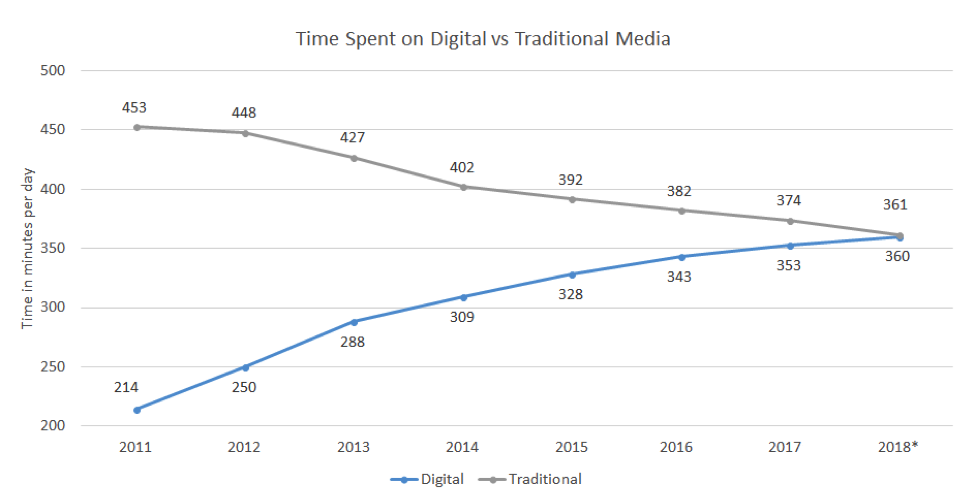
(Source: Statista)
Alphabet and Facebook are the two largest digital advertising platforms. Both are unparalleled in their ability to offer powerful advertising solutions. They each command the attention of over 1bn users per day, and offer specific, and meaningful ways to target their audience. As a result, they are estimated to capture 77c of every incremental dollar allocated to digital advertising over the coming years.
Digital Payments: Visa and Mastercard dominate
The addressable cash economy is estimated to be greater than 17 trillion US dollars. If you believe, as we do, that cash will be used less and less overtime, then companies that process digital payments will prosper for a long time to come. Two beneficiaries of this trend are Visa and Mastercard. Together, they process the majority of digital payments globally, and are benefitting from the growing acceptance of digital payments over cash.
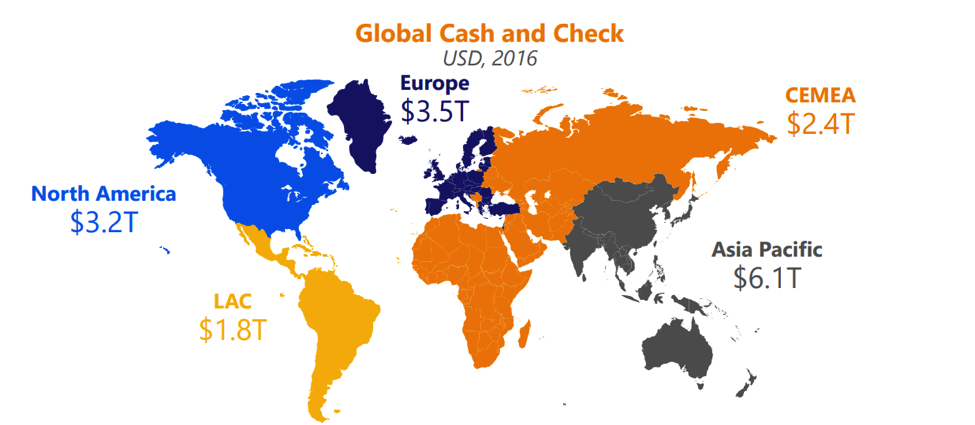
Visa and Mastercard provide the payment infrastructure processing thousands of transactions per second on their proprietary networks. They receive a very small fee each time a payment is processed. To give you some context about their size, Visa processes around 3,500 transactions per second. Needless to say, this infrastructure is incredibly difficult to replicate and highly valuable.
Digital Ecosystem: Sticky users
A digital ecosystem combines applications and services with proprietary software infrastructure. Each application and service in the ecosystem works together, ensuring the consumer experience is familiar and enjoyable. The strongest digital ecosystems incorporate hardware as a third layer. This third layer ensures the consumer’s end to end experience is seamless. A great example of this is Apple, whose ecosystem is illustrated in the chart below.
Apple’s Ecosystem
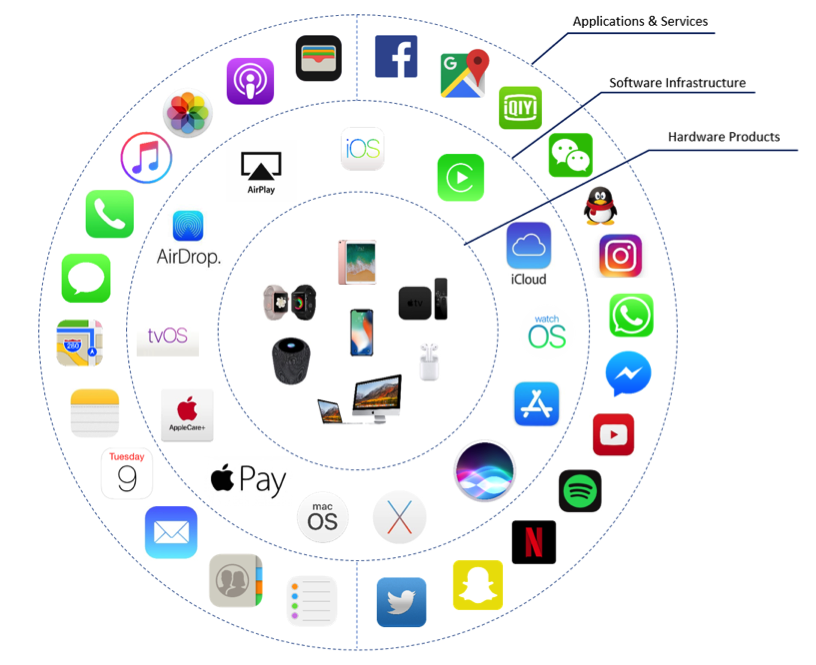
(Source: Swell Asset Management)
Once a consumer purchases Apple hardware, such as an iPhone or Mac, and begins using the software and services, they become entrenched. This leads to the purchase of more products and services over time. At last count, Apple’s installed base of devices was over 1.3 billion products. Thanks to the strength of their ecosystem, this installed base is translating into Services Revenue, which has been growing at over 20% per year, and is forecast to surpass US$33 billion in 2018.
Conclusion
While Australia is familiar and comfortable, it does not offer comparable opportunities to access the ‘new economy’. The next decade will unearth further advancement of new technologies such as augmented reality and artificial intelligence, ushering in a suite of new applications and services.
Apple, Google, Facebook, Visa & Mastercard are extremely well placed to ride the next wave of innovation. Accordingly, Aussie investors may like to consider adding a portfolio of high quality, global companies to their domestic portfolio.
5 topics

